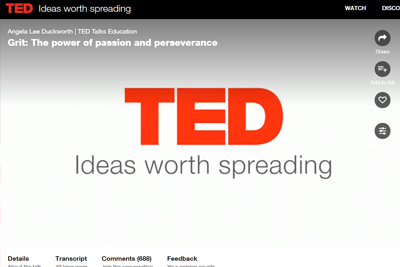Grit: The Power of Passion and Perseverance

Tomoki Hotta
Vice Chancellor
Babel University Professional School of Translation
Pennsylvania University psychology professor Angela Lee Duckworth’s book Grit: The Power of Passion and Perseverance became a bestseller in 2016, and over nine million people have watched her video presentation on TED Talks on the content of her book.
http://www.ted.com/talks/angela_lee_duckworth_grit_the_power_of_passion_and_perseverance
When Duckworth was 27 years old, she left her consulting job to become a teacher and taught math to seventh graders in a New York public school. She later left the teaching field to study psychology and become a psychologist. Her research as a psychologist focused on studying adults and children in various environments facing difficult problems.
When asked what the most significant predictor of success is, many people would say ability. However, according to Duckworth’s research with West Point Military Academy and the Army Green Berets, it became clear that ability and success were not always tied together.
Whether it was the “beast barracks”, the seven-week strenuous training at West Point Military Academy, or the rigorous selection process for the Green Berets, those who made it through with flying colors were not those considered talented or promising, or even those with physical ability or aptitude, but those who showed grit even when they failed.
This idea holds true outside the military as well. According to Duckworth’s survey of several thousand high school juniors in the Chicago public schools, grittier students were significantly more likely to graduate.
Take each letter of the word grit, and you can break it down into the following four characteristics. The first letter stands for guts; not shrinking from hardships or adversity. The next letter stands for resilience, which is bouncing back from setbacks. The third letter stands for initiative or taking the lead. Finally, “T” stands for tenacity or perseverance.
Duckworth also cites the idea of a “growth mindset” as the best way to raise children who are gritty. This idea was developed by Dr. Carol Dweck and is the belief that the ability to learn is not fixed but can change with your effort.
Dr. Dweck has shown that when kids read and learn about the brain and intelligence, and how intelligence is not inherent but can continue to grow in response to challenge, they’re much more likely to not fear failure when faced with difficult problems and proactively tackle those problems. That’s because they understand that failure is not permanent, which is why growth mindset is effective for explaining how to develop grit.
Duckworth says that what entrepreneurs, business persons, athletes, artists, and other “successful people” who’ve produced tremendous results have in common is grit. Baseball player Suzuki Ichiro is one example of a professional whose continued passion and tenacity were more significant contributors to success than ability or aptitude.
So, remember the saying “practice makes perfect” as you embrace the challenges of life.




